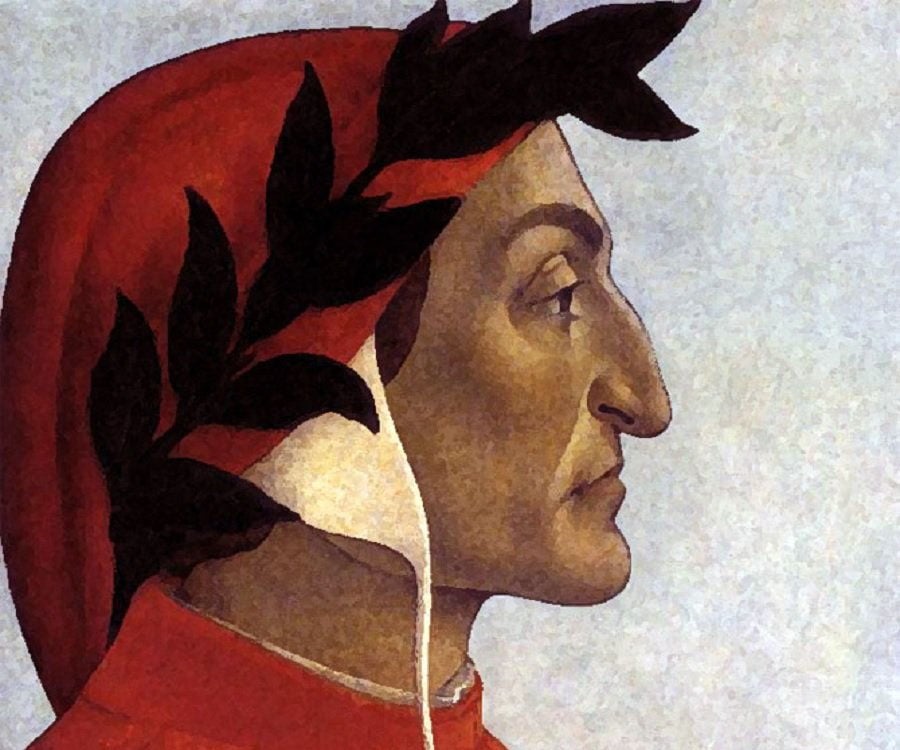I'm going to provide the summaries and my part of the discussion on our Goodreads Catholic Book Club read of Dante Alighieri's The Divine Comedy. Here is a summary of the first five Cantos.
We
meet Dante lost in a wood, distraught. and suffering a midlife crises. To make matters worse, he comes across three
beasts, a leopard, a lion, and a she-wolf that threatens his life. While fleeing, he comes across the spirit of
Virgil, the Roman poet, who promises to lead him to safety, but he must follow
through the parts of hereafter. Dante,
desperate, agrees. (Canto I)
Having
followed Virgil, Dante now stops to question him and doubt his worthiness to
make such a journey. Virgil reassures
him by telling Dante how he was summoned for this mission. It was three ladies in heaven who organized
Dante’s salvation. It started with the
Blessed Mother moved to pity for Dante that she summoned St. Lucy, who in turn
beseeched Beatrice to take some action.
Beatrice knowing of Dante’s love for the poet Virgil, begged him to lead
Dante through this journey. Dante now
reassured agrees and follows Virgil on.
(Canto II)
They
stop before the Gate of Hell and absorb its hard message. They enter and find what some have called the
pre-circle (hell proper will be made up of narrowing, descending circles) where
the souls who never took a moral stand, either for good or evil, reside. Their eternity will be spent in mindless activity
with no hope of ending and forever envious of those who did. They move on to the first river in hell,
Acheron, where they will be ferried across to hell proper by Charon, who is
taken aback by a living man. Virgil
explains, and they are ferried across.
When Dante steps foot in hell, the sounds, the darkness and atmosphere
sends terror into him and he suddenly drops to the ground having fainted. (Canto III)
Thunder
awakes Dante from his faint, and the two proceed into the first circle of hell,
Limbo, the place where those not baptized and pre-Christians, yet morally good,
reside. This is the place where Virgil
normally resides and he tells Dante of one time when Christ came and lifted out
the Jewish saints who had resided there.
They walk further and come to the only place in hell where there is
natural light and it is the place of the great pre-Christian poets. A group of four poets invite Dante and Virgil
into their group and they discuss poetry.
And they move on to a castle and in the inner meadow and meet great
pre-Christians statesmen (active life) and philosophers (contemplative
life). (Canto IV)
The
two descend into the second circle – the first circle where everlasting
punishment is doled out. They meet
Minos, the King who became a judge in the underworld in Greek mythology. He is the one who assigns which circle the
soul will forever reside in. He too
questions whether a living being can enter, but Virgil explains it as
well. They have come to the circle of
lust, where the souls that reside will be forever blown about by swirling,
fierce winds, as birds are blown out in a storm. Dante meets the souls Francesca and Paolo,
who committed adultery and then slain together by Francesca’s husband, who was
also Paolo’s brother. Francesca explains
the circumstances of how they fell into sin, all stemming from having read of a
adulterous love affair in a book. Upon
hearing this, Dante faints for the second time in three cantos. (Canto V)


I'm looking forward to more summaries like this - - - assuming that you decide to write them. If not, that's also good.
ReplyDeleteI'd also like to see what you think of the Divine Comedy and its parts. I started readying the Sayers translation - - - quite a while back now. Didn't finish "Paradise."
At the time I figured it was because Sayers died before doing it. The Sayers "Paradise" was completed by Barbara Reynolds: as I remember, an associate of Sayers who had worked with Sayers on the first two sections. At the time, I thought my getting bogged down in "Paradise" - *there's* a title - was due to Reynolds being a very capable scholar, but without Sayers' gift for writing. Now, I suspect I simply wasn't ready for the content.
Back to Dante, summaries, and you: Thanks for posting this! It's a good reminder, and seems like a good overview of one of Western literature's gems.
Yes Brian, not only will I write the summaries for each Canto, but I will post all my comments I make in my Goodreads Catholic Thought Book Club. I've just posted my comments on the first five Cantos.
DeleteI'm glad you're reading along. That's great!